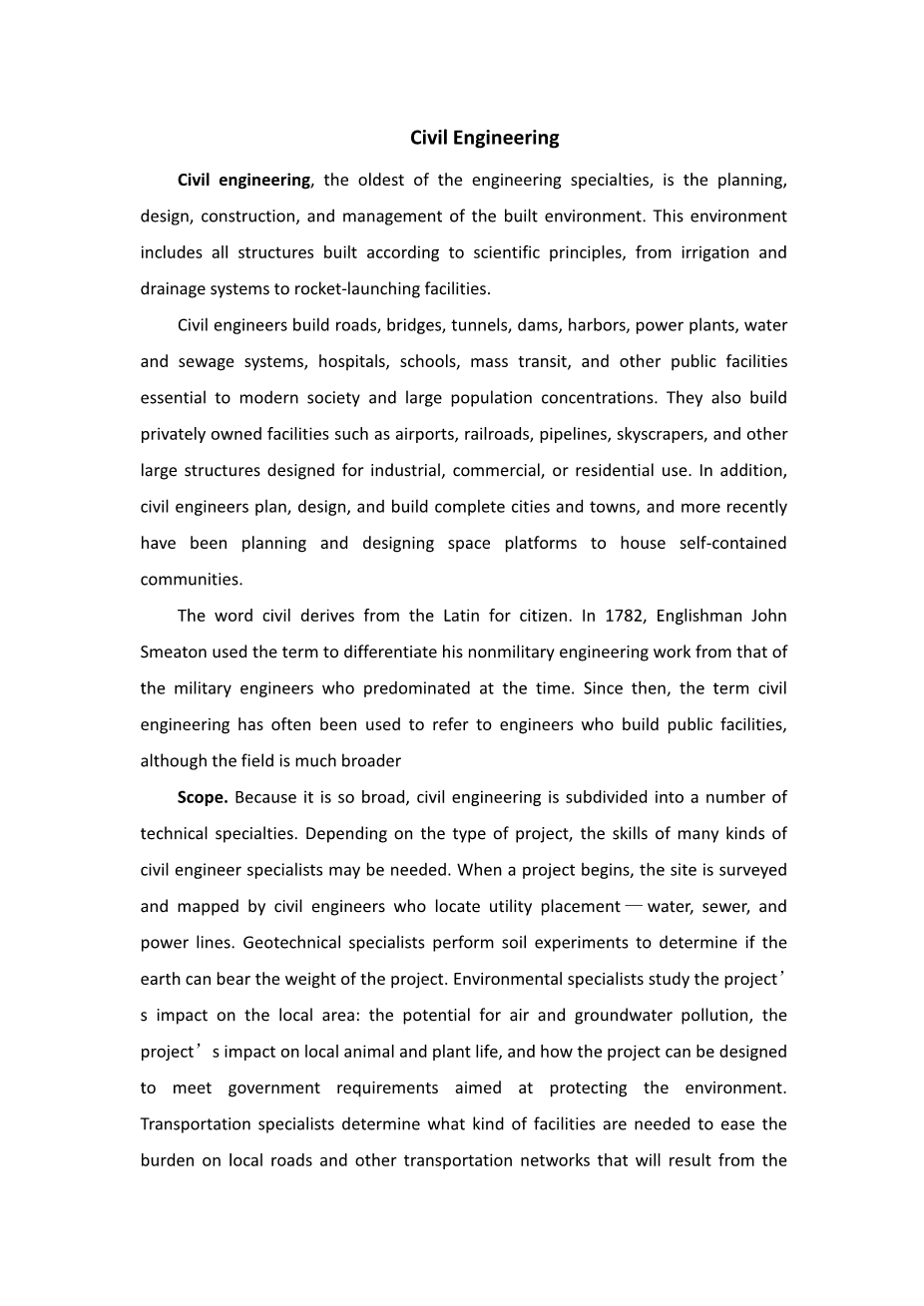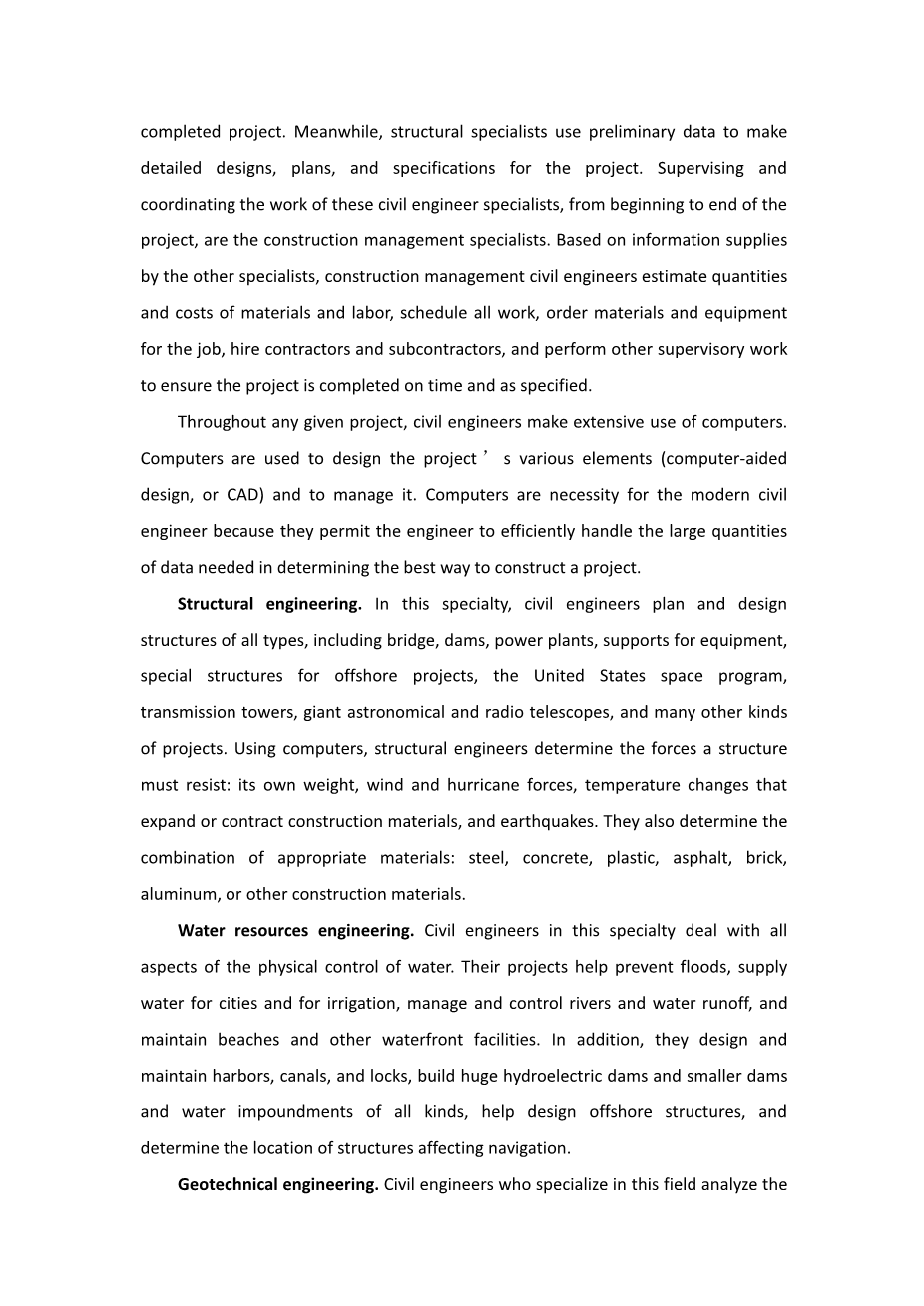Civil Engineering
Civil engineering, the oldest of the engineering specialties, is the planning, design, construction, and management of the built environment. This environment includes all structures built according to scientific principles, from irrigation and drainage systems to rocket-launching facilities.
Civil engineers build roads, bridges, tunnels, dams, harbors, power plants, water and sewage systems, hospitals, schools, mass transit, and other public facilities essential to modern society and large population concentrations. They also build privately owned facilities such as airports, railroads, pipelines, skyscrapers, and other large structures designed for industrial, commercial, or residential use. In addition, civil engineers plan, design, and build complete cities and towns, and more recently have been planning and designing space platforms to house self-contained communities.
The word civil derives from the Latin for citizen. In 1782, Englishman John Smeaton used the term to differentiate his nonmilitary engineering work from that of the military engineers who predominated at the time. Since then, the term civil engineering has often been used to refer to engineers who build public facilities, although the field is much broader
Scope. Because it is so broad, civil engineering is subdivided into a number of technical specialties. Depending on the type of project, the skills of many kinds of civil engineer specialists may be needed. When a project begins, the site is surveyed and mapped by civil engineers who locate utility placement—water, sewer, and power lines. Geotechnical specialists perform soil experiments to determine if the earth can bear the weight of the project. Environmental specialists study the projectrsquo;s impact on the local area: the potential for air and groundwater pollution, the projectrsquo;s impact on local animal and plant life, and how the project can be designed to meet government requirements aimed at protecting the environment. Transportation specialists determine what kind of facilities are needed to ease the burden on local roads and other transportation networks that will result from the completed project. Meanwhile, structural specialists use preliminary data to make detailed designs, plans, and specifications for the project. Supervising and coordinating the work of these civil engineer specialists, from beginning to end of the project, are the construction management specialists. Based on information supplies by the other specialists, construction management civil engineers estimate quantities and costs of materials and labor, schedule all work, order materials and equipment for the job, hire contractors and subcontractors, and perform other supervisory work to ensure the project is completed on time and as specified.
Throughout any given project, civil engineers make extensive use of computers. Computers are used to design the projectrsquo;s various elements (computer-aided design, or CAD) and to manage it. Computers are necessity for the modern civil engineer because they permit the engineer to efficiently handle the large quantities of data needed in determining the best way to construct a project.
Structural engineering. In this specialty, civil engineers plan and design structures of all types, including bridge, dams, power plants, supports for equipment, special structures for offshore projects, the United States space program, transmission towers, giant astronomical and radio telescopes, and many other kinds of projects. Using computers, structural engineers determine the forces a structure must resist: its own weight, wind and hurricane forces, temperature changes that expand or contract construction materials, and earthquakes. They also determine the combination of appropriate materials: steel, concrete, plastic, asphalt, brick, aluminum, or other construction materials.
Water resources engineering. Civil engineers in this specialty deal with all aspects of the physical control of water. Their projects help prevent floods, supply water for cities and for irrigation, manage and control rivers and water runoff, and maintain beaches and other waterfront facilities. In addition, they design and maintain harbors, canals, and locks, build huge hydroelectric dams and smaller dams and water impoundments of all kinds, help design offshore structures, and determine the location of structures affecting navigation.
Geotechnical engineering. Civil engineers who specialize in this field analyze the properties of soils and rocks that support structures and affect structural behavior. They evaluate and work to
minimize the potential settlement of buildings and other structures that stems from the pressure of their weight on the earth. These engineers also evaluate and determine how to strengthen the stability of slopes and fills and how to protect structures against earthquakes and the effects of groundwater.
Environmental engineering. In this branch of engineering, civil engineers design, build and supervise systems to provide safe drinking water and to prevent and control pollution of water supplies, both on the surface and underground. They also design, build, and supervise projects to control or eliminate pollution of the land and air. These engineers build water and wastewater treatment plants, and design air scrubbers and other devices to minimize or eliminate air pollution caused by industrial processes, incineration, or other smoke-producing activities. They also work to control toxic and hazardous wastes through the construction of special dump sites or the neutralizing of toxic and hazardous substances. In addition, the engineers design and manage sanitary landfills to prevent pollution of surrounding land.
Transportation engineering. Civil engineer
剩余内容已隐藏,支付完成后下载完整资料


英语译文共 8 页,剩余内容已隐藏,支付完成后下载完整资料
资料编号:[612514],资料为PDF文档或Word文档,PDF文档可免费转换为Word
课题毕业论文、文献综述、任务书、外文翻译、程序设计、图纸设计等资料可联系客服协助查找。


